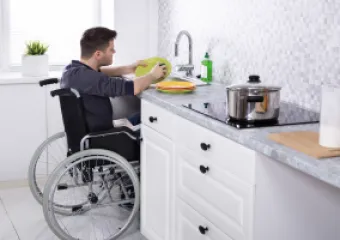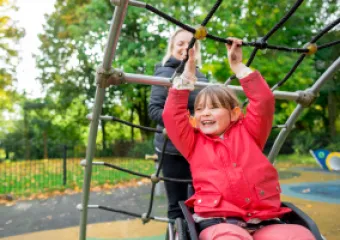Choose Independence
Home is a place to surround ourselves with the things and people who bring us joy.

According to the Centers for Disease Control and Prevention (CDC), social determinants of health, also called to unmet health related resources are "Conditions in the places where people live, learn, work, and play [that] affect a wide range of health risks and outcomes."
Trillium has been helping people with unmet health-related resource needs in our communities for years. Where a person lives, learns, works, and plays all have a large impact on their health. We focus on housing, food, transportation, interpersonal violence/toxic stress, and more through our work with other community-based organizations across North Carolina. Medicaid members can speak with their care manager about requesting resources for food, housing, transportation, and more.
Home is a place to surround ourselves with the things and people who bring us joy.

Promoting safe and affordable housing

Giving individuals of all ages and abilities the chance to play together outside


While the Healthy Opportunities Pilot has been paused, Trillium Advantage covers Value-Added Services and Member Incentive programs. Value-Added Service are specifically targeted to Tailored Plan members who experience challenges related to health disparities in order to improve their access to resources and overall health outcomes. Trillium’s Member Incentive Program helps members become more engaged in their health. It rewards members who complete health education tasks with gift cards and small rewards.
Due to a lack of funding currently available in the North Carolina General Assembly’s Senate or House budget bills, the state has stopped 1) all new service authorizations and 2) existing service delivery for all Healthy Opportunities Pilots services until further notice. This means that services provided under the Healthy Opportunities Pilots program will no longer be available after this date, including for individuals currently receiving services. Specifically:
Our member services team is available to answer your questions and provide guidance on available alternatives. You can contact us by phone at 1-877-685-2415
While services have been stopped, our hope is that this will only be a temporary pause, and Healthy Opportunities can resume once additional funds are appropriated by the General Assembly.
NCDHHS is launching the Healthy Opportunities Pilot, for eligible Medicaid members living in certain counties. The Healthy Opportunities Pilot is testing the impact of providing non-medical resources like housing, food and transportation to Medicaid enrollees. Trillium will work with NCDHHS and other designated entities to:
Trillium will work with the following Network Leads in the Healthy Opportunities Pilot. Each Network Lead contracts with Human Service Organizations (HSOs) in their pilot region to provide Pilot services to eligible members.
Beaufort, Bertie, Chowan, Edgecombe, Halifax, Hertford, Martin, Northampton, Pitt
Bladen, Brunswick, Columbus, New Hanover, Onslow, Pender
Pilot services is available to eligible Trillium Health Resources members. To qualify for pilot services, Medicaid managed care members must live in one of the above the listed pilot counties and have:
At least one Physical/Behavioral Health Criteria: (varies by population)
AND
At least one Social Risk Factor:
 Housing services aim to improve health outcomes and reduce housing-related health risks for members. Housing services include identifying housing needs and planning for stable, long-term housing. Housing navigation, support and sustaining services support members in developing independent living skills. Care managers work with members to support adequate living environments and promote health and safety.
Housing services aim to improve health outcomes and reduce housing-related health risks for members. Housing services include identifying housing needs and planning for stable, long-term housing. Housing navigation, support and sustaining services support members in developing independent living skills. Care managers work with members to support adequate living environments and promote health and safety.
Examples of Housing Services:

Interpersonal safety services and activities support members experiencing violence, abuse and toxic stress. Interpersonal safety services include planning and management, violence intervention services, parenting programs and home-visiting services to improve health outcomes. Care managers work with members to address and assist with interpersonal safety needs and social risk factors to provide appropriate support services.
Examples of Interpersonal Safety services:

Food services assist members experiencing food insecurity to promote health and well-being through evidence-based educational programs, food supplies, and assistance from trained specialists. Food services may include one-on-one case management, assistance accessing community-based food resources, food vouchers, and healthy food boxes
Examples of Food services:

Transportation services link members to existing transportation resources, provide reimbursement for public and private transportation and provide transportation to other related services. Transportation services assist members in non-medical situations to promote community engagement and health outcomes. Members may receive transportation to locations such as grocery stores, job interviews/places of work, places of recreation, group parenting classes/childcare locations and health and wellness-related educational events.
Examples of Transportation services: